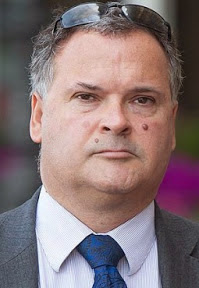 Lawyers fearing hit on their incomes protest against court reforms. LET’S FACE IT, the current, “Victorian”, framework of Scotland’s courts & justice system is not about delivering access to justice to the people of Scotland. Rather, it is, in actuality, nothing more than a business model for the legal profession to charge exorbitant, prohibitive fees to clients, milk the taxpayer for hundreds of millions of pounds in legal aid payments, and rip off clients and get away with it, backed up by the solicitor’s safety net of lawyers continuing to regulate, and cover up for, their colleagues.
Lawyers fearing hit on their incomes protest against court reforms. LET’S FACE IT, the current, “Victorian”, framework of Scotland’s courts & justice system is not about delivering access to justice to the people of Scotland. Rather, it is, in actuality, nothing more than a business model for the legal profession to charge exorbitant, prohibitive fees to clients, milk the taxpayer for hundreds of millions of pounds in legal aid payments, and rip off clients and get away with it, backed up by the solicitor’s safety net of lawyers continuing to regulate, and cover up for, their colleagues.
So, when the Scottish Government, proposes the Courts Reform (Scotland) Bill of the Making Justice Work programme to clean up the pig-sty of justice system presided over by a Lord President who himself branded Scots justice as unfit for purpose, failing society and “Victorian”, it will come as little surprise to lean the legal profession, who’s income is derived from taking the role of a skulking predator lying in swamps waiting for their victims to come to them, is up in arms at the prospect of losing their chance to drain people of their wealth, at will.
The Courts Reform (Scotland) Bill if passed, will see all cases where thousands of cases involving damages of less than £150,000 are at stake, heard by new summary sheriffs instead of the antiquated Court of Session. The Scottish Government hopes the reformed process will be quicker and cheaper than the current justice model, which Audit Scotland has estimated is wasting £55 million a year – and many tens of millions more from clients who are faced with life draining fee demands from law firms who consistently fail their clients.
The proposals put forward by the Scottish Government, provide the legal framework for implementing the majority of recommendations of the Scottish Civil Courts Review, led by Lord Gill the former Lord Justice Clerk and now Lord President of the Court of Session, once known for his views on the sheer idiocy of Scotland’s Civil Justice system. The proposals also discuss a redistribution of business from the Court of Session to the sheriff courts, creating a new lower tier of judiciary in the sheriff court called the summary sheriffs with jurisdiction in certain civil cases and summary criminal cases. Other proposed measures include the creation of a new national sheriff appeal court and a new national specialist personal injury court.
Admittedly, the Scottish Government’s proposals could go further than Lord Gill’s in house rendition of the Scots public’s right to access to justice, however, what has already been proposed has sufficiently stirred the legal profession into thoughts of further massed protests outside the Scottish Parliament and more rumoured court strikes, if justice is made to work for Scots, rather than made to pay for lawyers.
Predictably, the Law Society of Scotland claims there will be all sorts of dangers to the justice system, should our “Victorian”, perhaps even stone age courts system be reformed, warning in a Press Release that the Scottish Government proposals to radically overhaul Scotland's civil court structure could produce a deluge of work for Scotland's sheriff courts, causing significant delays for those who depend on local courts.
The Law Society also claimed the proposals contained in the draft Courts Reform (Scotland) Bill, significantly increase the threshold for cases to be heard by the Court of Session. Currently, the Court of Session can hear all civil cases where the sum sued for is £5,000 or above. The draft Bill proposes changing the requirements, so only cases valued at over £150,000 can be raised in the Court of Session.
Kim Leslie, Convener of the Law Society of Scotland's Civil Justice Committee said: "If the proposals are implemented as currently drafted, a deluge of cases could hit Scotland's sheriff courts. "There is a risk that sheriff courts will be unable to cope with the volume of new work suddenly arriving at their door. We expect this to be made worse by the recent Scottish Government decision to support the closure of 20% of sheriff courts across Scotland. "If sheriff courts are unable to cope with the increased workload, there could be significant delays for court users."
The Law Society of Scotland's Civil Justice Committee claimed they carried out research in to the effects of raising the threshold to £150,000. The ‘research’, carried out by the Law Society itself (and to be taken with a pinch of salt) allegedly revealed that only 254 cases settled with a value in excess of this figure, which represented less than 2% of Court of Session business.
Ms Leslie added: "If the proposals are implemented as currently drafted, we could end up in the paradoxical situation of an almost completely deserted Court of Session, whilst court users in the sheriff courts suffer long delays as the courts struggle to cope with an increased workload. The Scottish Government is right to raise the threshold; however, we would prefer to see the limit set at no more than £50,000. This would allow cases with a lower value, but which still raise complex issues of matter of fact or law, to continue to be heard by the Court of Session."
The Law Society of Scotland’s full response to the Scottish Government’s consultation on the Courts Reform (Scotland) Bill can be found here HERE and it is clear throughout that Court closures and delays have been used to mask the Law Society’s fears its members may end up out of pocket and unable to rip off enough clients to survive another day.
A deserted Court of Session - Now that would be a bitter blow to the legions of Court of Session senators on nearly £200,000 a year who end up with pension pots of up to one million pounds, and are so trustworthy they dare not adhere to a register of interests for Scotland’s judiciary in case the public find out our courts system is little more than a closed shop, and in some cases, family run business bent on wielding unchecked influence over public life and inflating profits, salaries & perks for those within it, instead of providing Scots with a justice system fit for purpose.
The Faculty of Advocates joined the Law Society in objecting to the Scottish Government’s plans, claiming the reforms will create a system where those who can afford it receive the best legal representation, while those on legal aid will suffer – much like how the current system operates. The Faculty of Advocate’s response can be found online HERE
The FoA said in a statement: “The effect of these combined measures will, in the view of the faculty, fundamentally undermine both access to justice and equality of representation. Litigants choose to bring cases in the Court of Session notwithstanding that they could, as the law currently stands, bring them in the sheriff court. They do so because the Court of Session provides a better forum for resolution of their disputes. The proposal would in effect deprive individuals on low and moderate incomes and SMEs [small and medium sized businesses] with serious cases, of the right and ability to instruct an advocate. This aspect of the proposal would favour wealthy and corporate litigants, who can afford to instruct counsel, over ordinary people and would create inequality in the justice system.”
Above the howls of protestations of the legal profession, who are now rumoured to be planning court disruption and massed protests outside the Scottish Parliament when the bill is to be voted on, the Scottish Government has made it clear the reforms and court closures are necessary to save money and streamline the system, and will not overburden the remaining courts.
A spokesman said: “The Scottish Government accepted the Scottish Court Service’s proposals to change the structure of our courts. Their proposals are now being scrutinised by parliament.The fragmented, outdated court system we inherited, where many smaller courts are not fit for purpose and are underused, is no longer sustainable.”
MAKING JUSTICE WORK – WHAT IS IT ?
The Making Justice Work programme brings together a range of reforms to the structure and processes of the courts, access to justice and tribunals and administrative justice. It has been developed and is being delivered with partners across the justice system, including the Crown Office and Procurator Fiscal Service, Scottish Court Service, Scottish Legal Aid Board and the Police.
As one of the justice outcomes change programmes* , Making Justice Work (MJW) contributes to the delivery of National Outcome 16, 'Our public services are high quality, continually improving, efficient and responsive to local people's needs'. The programme contains five overarching projects, which cover both civil and criminal justice:
MJW Project 1: Delivering efficient and effective court structures - To create a cost effective, proportionate court structure in which cases and appeals are heard by the right court in both civil and criminal cases, reserving the use of the highest courts for the most serious and complex cases.
MJW Project 2: Improving procedures and case management - To improve the procedures of the justice system and to introduce active and effective management of cases, in order to minimise delays and adjournments to ensure the most cost effective use of precious court time.
MJW Project 3: Enabling access to justice - To develop mechanisms which will support and empower citizens to avoid or resolve informally disputes and problems wherever possible, and to ensure they have access to appropriate and proportionate advice, and to a full range of methods of dispute resolution, including courts and tribunals where necessary, and appropriate alternatives.
MJW Project 4: Co-ordinating IT and Management Information - To provide the strategic platform for the development of IT, data management and management information to ensure all justice organisations have access to the data and information that they need, with efficient administrative processes supported by appropriate technology.
MJW Project 5: Establishing a Scottish Tribunals Service - To establish an efficient and effective Scottish Tribunals Service by merging the administration of devolved tribunals and through the devolution of reserved tribunals to Scotland.
All five MJW projects are now up and running. You may have come across some of those that are being lead by partners across the justice system - for example: getting people to court; and the new summary system model.
National Outcome 16 can be achieved by delivery of benefits across the justice system. A benefits framework is being used to evaluate and track progress across the whole programme, to provide clarity to project managers as to where their own projects fit in, and identify gaps where we may need to initiate new work.
The Scottish Government are taking a co-ordinated system wide approach, integrating policy development (eg response to Civil Courts Review & Sheriff & Jury) with short term projects to save money, working with justice operational delivery partners and identifying, considering and tracking the delivery of benefits across the system
 New justice quango to make rules for Scotland’s unfit for purpose Court of Session, Sheriff Courts. EARLIER this week the latest attempt to improve Scotland’s unfit for purpose, “Victorian” civil justice system was announced by Scotland’s top judge, Lord President Lord Brian Gill, in the form of the new Scottish Civil Justice Council (SCJC), the latest quango from Scotland’s antiquated courts system loaded with lawyers, judges and a mere two consumer representatives, which is charged with improving the rules governing civil justice in Scotland.
New justice quango to make rules for Scotland’s unfit for purpose Court of Session, Sheriff Courts. EARLIER this week the latest attempt to improve Scotland’s unfit for purpose, “Victorian” civil justice system was announced by Scotland’s top judge, Lord President Lord Brian Gill, in the form of the new Scottish Civil Justice Council (SCJC), the latest quango from Scotland’s antiquated courts system loaded with lawyers, judges and a mere two consumer representatives, which is charged with improving the rules governing civil justice in Scotland. 






